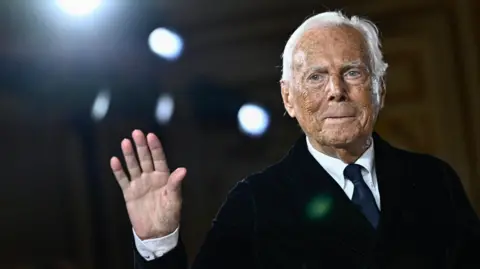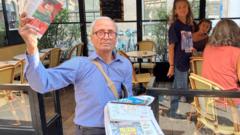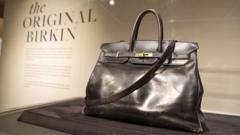In the vibrant ambiance of St.-Germain-des-Prés, the joyous sound of Ali Akbar's signature call, “Ça y est!” echoes through the narrow streets. Born in Rawalpindi, Pakistan, Akbar has been peddling newspapers for over half a century, captivating locals and tourists alike with his charisma and wit. He often spices up his sales pitch with humorous fabrications, making headlines like “The war is over, Putin asks forgiveness!” to spark laughter in a serious world.
Despite the charm of this traditional profession, Akbar represents a dwindling trade, a reflection of the digital age's impact. With newspaper sales plummeting, he stands as a monument to the past, reminiscent of the iconic movie "Breathless" where the profession peaked in the ’60s. However, unlike the film's fleeting moments of nostalgia, Akbar's reality is marked by an urgent need for recognition and preservation of a cultural artifact.
The Café de Flore and Brasserie Lipp, two renowned Parisian establishments, serve as his backdrop, where patrons enjoy rich culinary experiences alongside remnants of cultural history. The evolution from physical newspapers to digital counterparts poses challenges for figures like Akbar, yet his persistence and humor spotlight the importance of personal interaction in an increasingly disconnected world.
As Parisians and tourists cross paths with this spirited seller, they are inadvertently drawn into a shared narrative, one that celebrates the beauty of human connection through the simple act of buying a newspaper. In an era when screens dominate, Ali Akbar's story remains a vibrant reminder of where we have been, and perhaps, what we stand to lose.
Despite the charm of this traditional profession, Akbar represents a dwindling trade, a reflection of the digital age's impact. With newspaper sales plummeting, he stands as a monument to the past, reminiscent of the iconic movie "Breathless" where the profession peaked in the ’60s. However, unlike the film's fleeting moments of nostalgia, Akbar's reality is marked by an urgent need for recognition and preservation of a cultural artifact.
The Café de Flore and Brasserie Lipp, two renowned Parisian establishments, serve as his backdrop, where patrons enjoy rich culinary experiences alongside remnants of cultural history. The evolution from physical newspapers to digital counterparts poses challenges for figures like Akbar, yet his persistence and humor spotlight the importance of personal interaction in an increasingly disconnected world.
As Parisians and tourists cross paths with this spirited seller, they are inadvertently drawn into a shared narrative, one that celebrates the beauty of human connection through the simple act of buying a newspaper. In an era when screens dominate, Ali Akbar's story remains a vibrant reminder of where we have been, and perhaps, what we stand to lose.





















